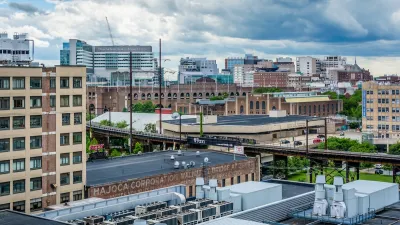Critics of card-only transactions say they exclude ‘underbanked’ individuals and limit access to essential services.

Writing in Smart Cities Dive, Paige Gross explains a “newly enforced” Washington, D.C. law that prohibits businesses from eliminating cash transactions. “Under the newly enforced law, it’s illegal for direct-to-consumer businesses — including bars, restaurants, general retailers and food stores — to refuse cash, charge a higher price to cash-paying customers or hang signs that say cash isn’t accepted.”
The law exempts online transactions and some parking garages. Other businesses must accept cash or provide a device on site where customers can convert cash to a prepaid card. Cashless payments, which some business owners consider safer than handling and transporting cash, became more popular in the wake of the pandemic, when social distancing called for touchless transactions.
Supporters of the ban say cashless transactions discriminate against ‘unbanked’ residents, who make up 8 percent of the D.C. population. Cashless businesses “make it exceptionally hard for marginalized groups to carry on with their everyday lives, said Harry Hayman, a senior fellow for the Economy League of Greater Philadelphia’s Food Economy and Policy.”
FULL STORY: Washington, DC’s ban on cashless businesses, explained

Trump Administration Could Effectively End Housing Voucher Program
Federal officials are eyeing major cuts to the Section 8 program that helps millions of low-income households pay rent.

Planetizen Federal Action Tracker
A weekly monitor of how Trump’s orders and actions are impacting planners and planning in America.

Ken Jennings Launches Transit Web Series
The Jeopardy champ wants you to ride public transit.

USDOT Waters Down Self-Driving Car Regulations
The agency is reducing reporting requirements for autonomous vehicles and cars with self-driving features, prompting concern among safety advocates who say transparency is essential to the safe deployment of AV technology.

‘Minnesota Nice’ Isn’t so Nice When You Can’t Find a Place to Live
The Economic Development and Housing Challenge Program can help address the scourge of homelessness among Indigenous people.

NYC Open Streets Organizers Call for City Support
The number of open streets projects has dropped year after year as volunteer groups struggle to fund and staff them.
Urban Design for Planners 1: Software Tools
This six-course series explores essential urban design concepts using open source software and equips planners with the tools they need to participate fully in the urban design process.
Planning for Universal Design
Learn the tools for implementing Universal Design in planning regulations.
Heyer Gruel & Associates PA
Ada County Highway District
Institute for Housing and Urban Development Studies (IHS)
City of Grandview
Harvard GSD Executive Education
Toledo-Lucas County Plan Commissions
Salt Lake City
NYU Wagner Graduate School of Public Service





























